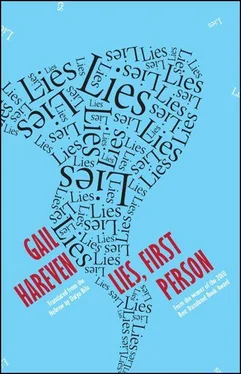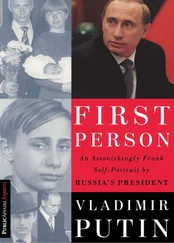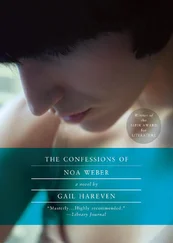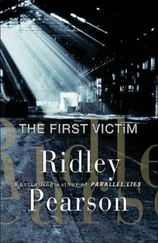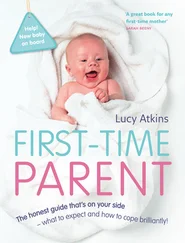When I entered the gallery the only person there was Lilly and Shabtai’s oldest son, busy sorting a pile of photographs into envelopes. He apologized for the disorder in the gallery and the fact that the courtyard was full of stuff: they had cleaned the place out today and not yet managed to put everything back. I said it didn’t matter, I felt quite at home, he could carry on working and I would take care of myself.
And so I did. I went to the fridge, took a bottle of vodka from the freezer, and poured myself a double shot. I didn’t forget to leave a banknote in the box, and with the brimming glass in my hand I went out to the courtyard, which, as he said, was not arranged for guests: the iron chairs were collected in one corner, their cushions stacked on a table, the other three tables were loaded with painting equipment.
I put a couple of cushions on one chair next to the ornamental fishpond, and dragged up another chair, set it next to the wall on the other side of the table and measured the distance between the two. Two chairs. Oded would have to take the hint. And what if he insisted on ignoring it and stayed?
Of all the events for which I had to prepare myself, I fixated on this foolishness and wasted the little time at my disposal contemplating it.
The last and only time I had asked Oded to go away was in the delivery room at the Hadassah Hospital, two hours before Yachin saw the light of day. Now too I had something to do, and I needed to concentrate all my strength and prevent it from dissolving under an anxious look and a tender touch.
But what could I say to him now, what exactly was I going to say to my husband? “Go away now, please be good enough in your great, your tremendous, your incomprehensible and incomparable goodness, to go away and leave me alone with this thing?” How would I say it? I was indeed alone with this thing, that was the truth and had been the truth since Monticello. So why tell any more lies? Elisheva had forgiven, and only I was alone with him, forced to be alone with him. And in a minute face to face. On my own. Myself and Not-man. Enough deception and pretending that it wasn’t so.
The enclosed courtyard stored the heat of the day, and the heat closed in on me like a dense physical entity. I hadn’t eaten all day, it was a long time since I had drunk vodka neat, and my guts, weakened by being treated so delicately, reacted instantly to the icy liquid setting them on fire.
The woman who had taken the stage to discuss the case of Oprah Winfrey was the last of the speakers, and I estimated that I had about half an hour to wait, no more, before my husband arrived on the scene and brought me the First Person. The possibility that he would decide not to bring him or that he would fail in his attempt to bring him didn’t occur to me; in fact, nothing much occurred to me at all. It was hot. The vodka went to my head. The goldfish darted nervously above the gleaming pebbles. One of the fish leapt out of the water and dived back again. Another one leapt in a mute suicide attempt. The pond was small and the water was overheated. The deep boils over and the cauldron hisses unappeased. Fish don’t hiss.
I thought of going to the fridge and bringing ice to cool the water down, and then I thought, “Fuck it,” and “Enough, enough already.” And I thought “Stop it, what are you thinking,” and “You’re so dumb,” and “What is this? What’s going on here? Don’t you understand? I’m not being photographed, I’m taking the photograph.”
And then they were there, my black belt and the spider legs about a meter behind him, and already opposite me: my husband in front, separating me from them, preventing any attempt to shake hands, gesturing Not-man to sit down and only then picking up a chair for himself and carrying it into the pool of light around the pond: carrying it, not dragging it.
“I told Professor Gotthilf that as a result of his lecture you’ve changed your mind and you’re prepared to talk to him. The professor realizes that it’s not a simple matter.”
“Aaron,” the voice corrected him courteously, “Aaron.”
The relative darkness under the wall blurred the deep furrows under his nose. What emerged in the relative darkness was the wavy crest of hair, the skinny vulture’s neck, and the movement of the lips.
“Family, as you say, Oded, is not a simple matter. Sometimes people make do with correct relations, but polite formalities in the family circle, and among Jews what’s more. . With my two sons the relationship is far from simple, but neither of them calls me professor.” Now he spoke in Hebrew.
“Aaron,” I pronounced, tasting the poison in my mouth.
“Thank you,” he said.
I was aware of the fact that I was sitting up stiffly in a theatrical manner, but even when I shifted my position slightly and unobtrusively, my limbs continued to arrange themselves in a self-conscious pose. I looked in silence at the stone wall opposite me, as a chatty voice — very different from his voice on the stage, but still, always the same deceptive, buffoonish voice — launched into a monologue about his sons.
His eldest—”who is in fact your second cousin”—his eldest was Orthodox, and not simply an Orthodox Jew but an important rabbi in Bnei Brak. He was said to be a great Torah scholar, and perhaps he was, to his regret he was not competent to judge. This son had given him nine grandchildren, and he had celebrated the Passover Seder with all of them: his son, his son’s children, their husbands and wives, and their children. A big family.
Did we too tend to regard Orthodoxy as Judaism in its purist form? — the lips chattered. Because it was his impression that many Israelis held this view. And at the same time, it would not be a mistake to say that their attitude toward the ultra-Orthodox smacked of more than a hint of anti-Semitism. We would agree with him that this was a fascinating phenomenon. He himself was of the opinion that it was connected to Zionism, connected — but not entirely dependent on. Had we read Otto Weininger? Every Jew should read Weininger once. His passion, the passionate eloquence of his self-hatred. . Hitler, by the way, said of him that he was the only decent Jew who ever existed. Decent? That perhaps not. But the authenticity of the emotion cannot be denied, however infuriating. To be honest, he was ready to confess to us that although he was of course grateful to his son and daughter-in-law for hosting him and observing the mitzvah of “honor thy father,” there were certain aspects of the ultra-Orthodox way of life, unaesthetic aspects that — how should he put it? — jarred on him. No doubt we understood what he was referring to. .
•
I glanced at Oded. He neither nodded nor shook his head, he never moved a muscle. Illuminated from the side in the hazy orange light of the garden lamps, he looked like the character of the bodyguard in one of the movies he liked, not any particular bodyguard but all the best ones put together: still, holding himself in suspense, but fully present. The voice that had moved an audience to clap its hands did not move my husband.
Three times in the past we had slipped away together here, when the Cinematheque café was crowded. That was in the distant days whose sweetness was liable to befuddle and weaken me even more than the heat. We would not sit together again.
The irony of fate — the voice continued — his younger son was in many ways the complete opposite of his brother: that is to say an American Jew, in other words an ignoramus. And perhaps it wasn’t the irony of fate but simply a typical Jewish fate. With this son too he has difficulties, but in his case the reasons are different. This son lives in Texas, and from him he has one granddaughter. She was born a year and a half ago, and to the grandfather’s regret he has not yet seen her.
Читать дальше
